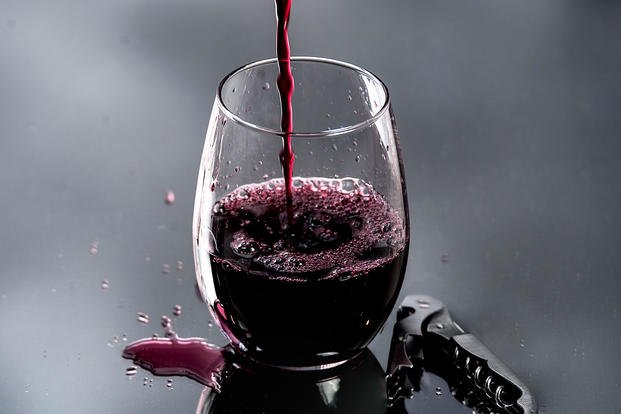Jennifer Barnhill is a columnist for Military.com writing about military families.
In 2023, the Surgeon General of the United States said that loneliness is more deadly than smoking 15 cigarettes a day. Given the deployments, long work hours and other demands of uniformed life, military spouses may be more at risk for developing dangerous coping mechanisms than the average American.
But many do not ask for help because they don't know they have a problem.
When we think about substance abuse and the military, we typically think about service members and veterans with stories that end with a dishonorable discharge or homelessness. But that's only one side of the story.
"From the outside perspective, things looked fine," said Liv, a Coast Guard spouse of 15 years who has no family history of substance abuse. She shared that, growing up in the Northeast, drinking was as ubiquitous as eating processed food: not great for you, but an accepted -- if not embraced -- part of life. After she met and married her husband in 2009 at the height of the recession, military deployments, moves and kids slowly entered the equation. Liv found herself juggling more and more. And the more she juggled, the more she felt the need to decompress with a glass of wine at the end of each night.
Because Liv and others in this piece have not made their struggles public within their communities, Military.com has omitted last names to maintain their privacy.
To deal with these stressors, Liv spent time with other spouses, usually centered around alcohol. They vented to each other about military life, trying to find a release for their stress. But because their drinking was normalized, these subtle cries for help went unanswered.
"Your self-care goes down the hill, and you're looking for a cheap dopamine fix," Liv said. "And now all of a sudden, you're pouring mimosas on a Wednesday at 11 and then, before you know it, you're putting rum in your coffee in the morning. … It's easy to hide, and it's easy to pretend everything's OK because no one knows who you are."
As time went on, Liv's drinking and mental health became so entwined that she made a plan to end her life. In a drunken rant, she shared her plans with her husband, who was deployed at the time. He took action and ensured she was checked into a hospital immediately.
"Then all of a sudden, I have a psychiatrist. I have a medication plan. I've got doctor's appointments. I have a therapist. I have people asking how I am. I have regular check-ins with my doctors," said Liv. "You have to literally get to a point where you are ready to kill yourself before anybody listens."
It may be that no one was listening to Liv because she did not fit the mold of what someone struggling with substance abuse would look like within the military community. While the Defense Department has publicly addressed the connection between military service and self-medicating behaviors, military spouse addiction is less discussed despite being well-documented.
According to a 2016 government study, military wives drink more than their civilian counterparts. Another study that tracked military spouse drinking habits over time cited that 23% engaged in risky drinking at the start of the study. According to the Centers for Disease Control and Prevention, risky alcohol use includes binge drinking, heavy drinking, and any use by pregnant women or those under age 21. Binge drinking is drinking five or more drinks on a single occasion for men or four or more drinks on a single occasion for women.
Substance abuse professionals use the acronym HALT (Hungry, Angry, Lonely and Tired) to identify the risk factors for alcohol abuse.
Military spouses are at risk for all four indicators, with 24% citing low or very low food security; 22% reporting being dissatisfied with military life; and 75% having experienced a deployment, something that leaves many -- if not all -- lonely and beyond exhausted.
"Alcohol is so normalized in the military community. It is part of every tradition. It is part of every single social event," said Evie King, military spouse and president of InDependent, an organization focused on wellness within the military community. "If you are a military spouse, who either is sober curious or in recovery … our military culture in a way is almost built to exclude that, because you are 'other.' You are the odd one."
One day, King was scrolling through Facebook when she saw a friend had posted a picture with a giant wine glass, one that can hold an entire bottle of wine. The caption read: "I can't wait until the kids go to sleep so I can have my one glass of wine."
"All I could think of was, 'How was no one looking at this as a cry for help?'" said King. Commenters laughed and agreed with her, saying they too wanted their one glass.
While writing this article, I was forced to reflect on my own drinking habits. I certainly drank my fill in college but didn't keep alcohol in the house until after I married my Navy husband and learned about something called "green lighting" while he was stationed in Japan. Overseas, it was common practice to call someone on the phone and yell "green light." If they can't say "red light" before you hang up, you get to go to their house, drink all their alcohol and eat their pizza rolls. It seemed like a fun tradition until it changed my own drinking patterns. Once I started "green light" prepping and buying beer for the house, we started to drink that beer and got used to having it around.
It was certainly our own choice to make this change, but I can't say for certain that it wasn't a direct result of a culture that made it too easy to drink a lot, alone. Drinking helped me feel like I belonged. At the admin desk getting my ID renewed, I was a dependent, but at the Navy ball, I was the wife who could play beer pong.
It is easy for those whose lives have not been upended by substances to dismiss risky drinking behavior as harmless, but research shows this is a fallacy. We have collectively convinced ourselves that if the military tradition of drinking was a problem, more within the community would seek help. But since we don't talk about it, our bad coping strategies are allowed to persist, and the unspoken solution is to offer help only after full-blown addiction has already taken hold.
"If you feel like you need a drink and you're having cravings for alcohol, or you feel like this is what it's going to take to calm you down, help you de-stress, or to make you feel better because you're depressed, that's usually one of the biggest warning signs for problematic substance use," said Zell Murdy, an addiction and mental health professional and military spouse. Clinicians believe there are four phases to alcoholism, including pre-alcoholic, early, middle and late stages. Behaviors in pre-alcoholic stages include self-medicating to de-stress, a period where some say bad coping strategies can be replaced with better ones.
"One of the things that you learn really early on working in substance use treatment is that nobody's there just because they decided they wanted to start drinking or using drugs and then they couldn't stop," said Murdy. "Everybody's there because they're trying to medicate for something."
And within the military community, there is no shortage of stressors.
"When my husband returned from the war, he brought a lot of issues with him," said Kellie, whose husband retired from the Army this year. "[PTSD] put a huge strain on our marriage. And so, I would drink just to cope with that or escape it a little bit in my mind."
Kellie lived on base and quickly befriended a next-door neighbor whose husband was deployed. They drank together while Kellie's husband worked 16-hour shifts and a grueling on-call schedule.
"It was a miserable time for our family. But my neighbor and I became really good friends, and we both found comfort in drinking together."
But Kellie was also drinking by herself, starting earlier in the day and drinking more and more. "It was very easy to binge drink every night. And a lot of women, I feel like a lot of women did, whether they want to admit it or not."
Kellie got a wake-up call when her second-grade son created a poster for his school's drug and alcohol awareness program, DARE. He drew a stick figure of his mother drinking. He was pointing his finger at her near the word "Stop!" and a conversation bubble that said, "My mom drinks drugs."
While this incident caused her guilt and shame, it was not until a friend of hers died by suicide that she realized she was headed down a darker road than she could have imagined. She reached out to her faith-based community for support during recovery.
Kellie and Liv's stories highlight the fact that current DoD programming focuses on late-stage addiction, not the underlying coping strategies that drive this abuse. But this model may offer help too late.
The 2022 Annual Report on Suicide in the Military found that 45% of service members who died by suicide had "select behavioral health diagnoses such as alcohol use disorder, depressive disorder, anxiety, trauma- or stressor-related disorder." The report did not provide similar demographic details that might provide insights into why military spouses die by suicide, other than citing their own status as current or past military service.
Despite there being a proven link between substance abuse and suicide, the DoD's 2022 report did not focus on the military culture's normalization of alcohol abuse. Instead, its strategy has been focused on limiting access to lethal means and increasing the availability of mental health services that integrate substance abuse treatment.
If deployments cause stress and stress causes anxiety and untreated anxiety can lead to substance abuse, it seems likely that the military lifestyle drives many to drink.
"The antidote to addiction is community," said Justine Evirs, a Navy veteran and spouse who became a substance abuse counselor after personally struggling with alcoholism. "[Service members] transition every two to three years. They know what they're gonna wear, where they're gonna work, and they go right into a community. They all bond over alcohol. Military spouses do the same. And as you know, we're isolated. And then add on some loss of identity, it's really just a recipe for disaster."
If you are struggling with addiction there are resources available:
- Civilian Resources: Alcoholics Anonymous, SMART Recovery and the 988 Suicide and Crisis Lifeline call center offers resources for those in crisis; Professional Substance Abuse Treatment Locator; Find a Therapist
- Military Resources: The Military Crisis Line offers help for potential alcohol or other substance use disorders; Military OneSource provides resources for individuals seeking assistance with their drinking; Military and Family Support Centers provide counseling to military personnel and their families.
- Family Resources: Information on How to Help a Family Member with Alcohol; Adult Children of Alcoholics; Al-Anon
- Learn More: The Four Stages of Alcoholism; Substance Use Assessment; 4 part series on alcoholism from InDependent; Research on Substance Use and Co-Occurring Mental Disorders
In addition to her reporting, Jennifer Barnhill is also the host of Military Dinner Table Conversations, a monthly reverse town hall with military families. She is a 2023 Bush Institute StandTo Veteran Leadership Program Scholar, the editor-in-chief of the National Military Spouse Network's Career Connections Magazine, and the military spouse liaison on The League of Wives Memorial Project.













